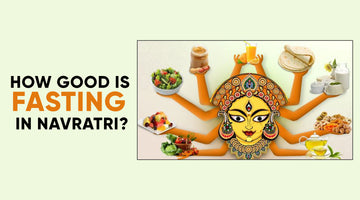
“We fast not to please the Divine, but to cleanse our body.” - Gurudev Sri Sri Ravi Shankar
Fasting is a denial of the body's physical needs as well as the mind's emotional cravings. The human mind has a tendency to draw patterns and become fixated on patterns. While following a pattern is a sign of self-discipline, it also has a drawback. When it comes to food and eating, we frequently forget that we should be eating to live, not the other way around.
The body requires only a certain amount of food for survival, and the stomach can only hold so much, but the senses continue to crave, and we continue to feed those cravings. Fasting is therefore a gift to an overburdened body and an overindulged mind. It allows the body and mind to break free from a pattern and take a new path.
Navratri is a nine-day Indian festival celebrated twice a year, once in the spring and once in the autumn. Fasting is a component of this festival, and those who observe it abstain from certain food groups in order to purify their body, mind, and soul.
Even if you do not fast ritually during Navratri, you should consider trying the Navratri diet because it is one of the healthiest diets available in an Ayurvedic way. The Navratri diet is not just any vegetarian or plant-based diet: it is a nine-day diet based on Ayurvedic principles of sattva that provides numerous health benefits.
There are three basic Gunas or qualities of life, according to Ayurveda:
Sattva: Denotes Purity and Peace;
Rajas: Denotes Passion and Luxury; and
Tamas: Denotes Lethargy and Negativity.
The diet to follow during the nine days of Navratri is entirely sattvic, which means it is extremely potent.
According to Ayurveda, one should avoid not only rajasic and tamasic foods like garlic, onions, meat, fish, and lentils, but also strong spices like asafoetida and garam masala. During the Navratri season, stimulants and intoxicants such as coffee, tea, and alcohol are also avoided. All of these foods and drinks are avoided to reduce the intake and presence of toxins, saturated fats, and other harmful substances in the body.
Celebrating Navratri With Ayurveda
Navratris, according to Ayurvedic experts, is the time for a seasonal cleanse or detox for our mind and body. Our bodies are confused by significant seasonal shifts that result in depleted Ojas. Our energy levels are low, and our immune system is vulnerable to infections. The festival of Navratri aids in striking a balance between hot and cold weather. Our doshas are balanced at the end of nine days, and our bodies and minds are fitter and more powerful.
The Relationship of Navaratri Practices to Ayurvedic Principles:
Fasting is recommended by Ayurveda as a method of detoxifying the body. Fasting is also known to digest Ama (Toxic Build-Up) in the body, Re-ignite the Agni (Digestive Fire), and help with overall health maintenance. Fasting is an important part of Navaratri - fasting on fruit and water, water alone, juices or specific foods only, and so on. Also, consider the timing of Navaratri: it occurs twice a year during "Ritu Sandhu" ie; between seasons, which Ayurveda considers to be the best time to detoxify the system.
Most of us do not wait until we are hungry to eat. Hunger is our body's way of signaling that it is ready to digest food. Eating before feeling hungry weakens the digestive system, which leads to stress and a weakened immune system. Fasting helps to de-stress and build immunity by rekindling the digestive fire.
Ayurvedic Trigunas and Navaratri:
The nine days of Navaratri are divided into three-day periods. Every three days is associated with a different Guna (Mental Quality). The goal is to overcome Tamas and Rajas in order to increase sattva within ourselves and our environments. Every three days is dedicated to a different Goddess. Now, the association with religion is a bit strong here - it was probably a way to connect with the people by giving them a godly figure to which they could relate. But even in these times, whether we are believers or not, we can still understand the message without becoming fixated on the religious aspect of things, if we so desire.
The first three days are for the Tamo Guna or Tamas, when we overcome any dullness or lethargy, shake off our ignorance and fear, work to release our stagnant and blocked emotions and energy, and work to eliminate all negative addictions and mind-body tendencies. The first three days are dedicated to Goddess Durga, who represents freedom from fear and inspires determination, willpower, and courage!
The second three-day period is for the Rajo Guna or Rajas when we transcend our egos, anger, desires, greed, envy, and impatience, and turn inward to seek peace, rather than outward for stimulation. This period is dedicated to Goddess Lakshmi, who represents abundance in all forms, including food, progeny, talents, courage, and general prosperity. Overall, the message is one of "abundance," both spiritually and materially, in order to bring prosperity and well-being.
The final three days are for the Sattva Guna, which is characterized by calmness, clarity, and harmony after we have turned our focus and consciousness inward. In this state, we see the good in everything and see life as a learning experience in general. This period is dedicated to Goddess Saraswati, who represents knowledge, the arts, and purity. The message is about the free flow of wisdom and consciousness in general.
While fasting is popular in India for religious reasons, fasting has become increasingly popular in recent years, particularly among the health community. Fasting is not synonymous with 'not eating.' It's all about staying healthy with the growing fasting trend. Fasting has recently been shown to have numerous health benefits, including increased weight loss and improved brain functioning.
Fasting helps to de-stress and build immunity by rekindling the digestive fire. So, let's look at some of the other health benefits of fasting according to Ayurveda!
Increases Life Span
Fasting can have a significant impact on the recycling of body cells. Cells that are constantly restoring themselves to achieve peak performance will have anti-aging effects. The aging process is slowed by refreshing cells, allowing you to stay young forever.
Intellect Enhancement.
According to the evidence, fasting can have a significant impact on brain health. Fasting can protect brain health and increase nerve cell production, which can help improve cognitive function. So, on your Vrat days, eat less and healthier food to improve both your brain function and brain structure.
Enhances The Immune System
Fasting can help your body fight off common illnesses like the common cold and cough before they begin. Fasting causes your cells to regenerate, replacing old cells that are part of your immune system. This results in a stronger immune system that cleans up your old system.
Prevents Serious Diseases
Fasting, in case you didn't know, can help the body rid itself of diseases like cancer. It may not completely protect you from cancer, but it can aid in its spread and tumor growth. Because cancer attacks your cells, cancer cannot form when there are no toxins in your body that can attack any of your cells due to fasting.
Tips: Intermittent fasting can help people undergoing chemotherapy suppress many of the side effects.
Aids Weight Loss
This one is self-evident; if you're already eating less, you can't possibly gain weight. You will most likely consume far less than you would on a typical day. Fasting burns approximately 1750 calories on average, resulting in faster weight loss.
Let us fast from a place of awareness, joy, and giving during the auspicious occasions of Navratri 2022, and incorporate light exercise, yoga, and meditation into our daily lives to reap the benefits. AADAR has always been logical with its belief in Ayurveda and always encourages its customers to start medicating with Ayurveda to have a better life that is disease free and without any side effects.




